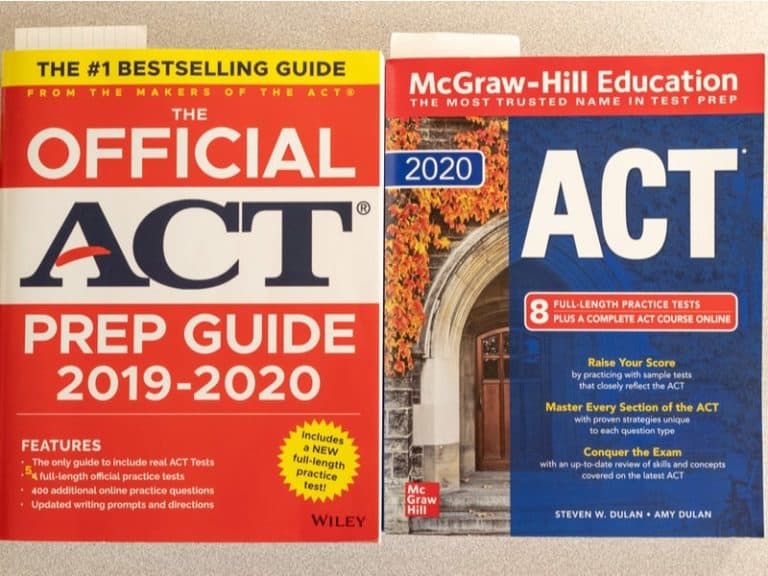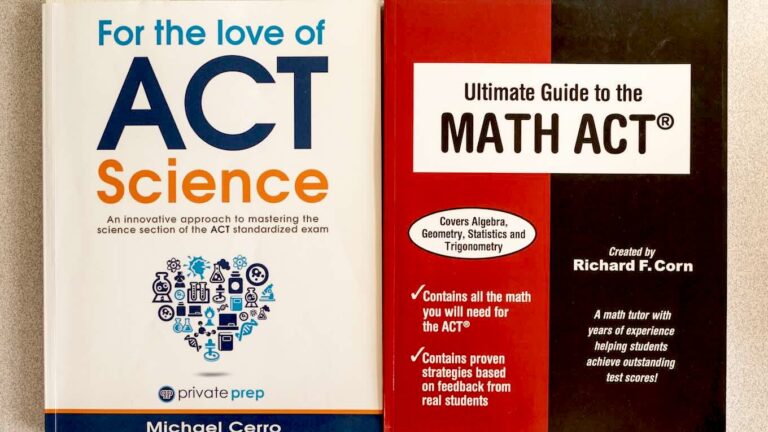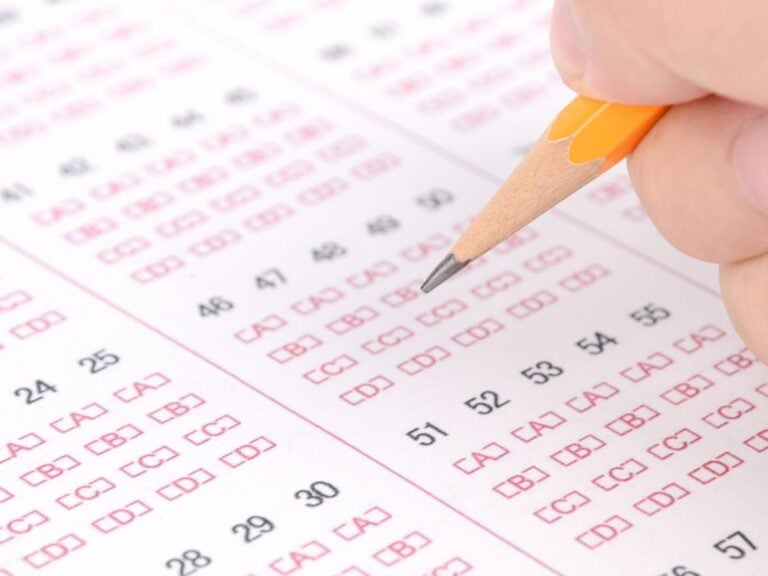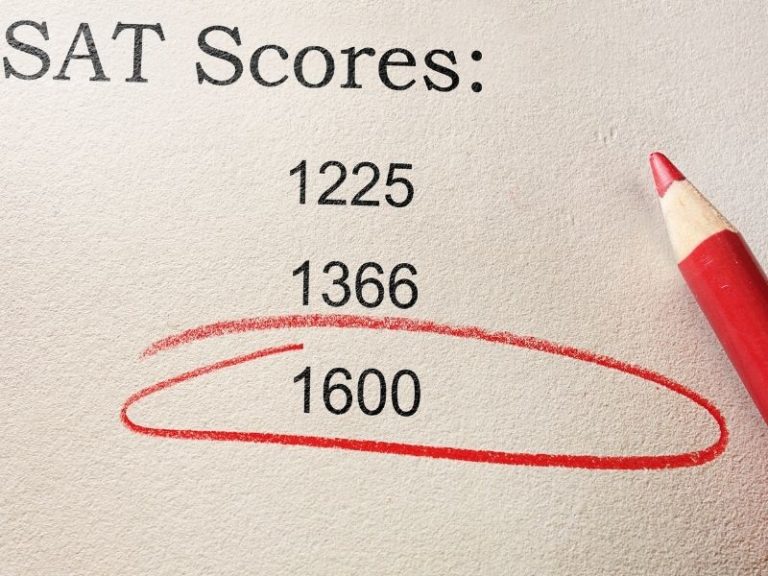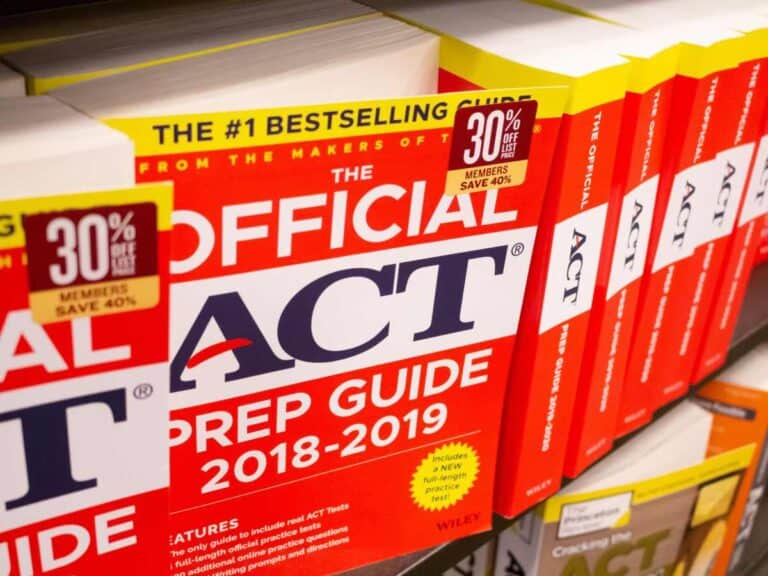How To Do Well on the ACT Without Studying?
Many colleges and universities require applicants to submit their ACT scores. More importantly, they require applicants to get a certain ACT score to get accepted. It’s important to prepare for the standardized exam, which necessitates lots of time and energy. But can you do well on the test without putting any efforts?
To do well on the ACT without studying, answer easy questions first and use the process of elimination. Use diagrams and visuals to one’s full advantage. Make intelligent guesses to get good ACT scores. There’s no penalty for guessing, and there’s a 20% chance of getting the right answer each time.
Most students take the ACT in either their junior or senior year of high school. Some take the ACT in both years to increase their chances of getting high ACT scores.
Students can take the ACT up to 12 times — every year, there are usually seven ACT dates. Some states have additional ACT dates. However, it doesn’t mean that taking the ACT as many as 12 times is the best option.
That’s because the standardized exam doesn’t come free of charge. Here are the costs of taking the ACT:
- The full ACT: $60
- The full ACT (with Writing): $80
- Test option change: $20
If you wish to take the ACT only once and you want to make sure that you get a score good enough to get you admitted into at least one of your preferred colleges, read on. Below, you will come across some of the most effective tips on doing well on the ACT even without studying.
But first, let’s answer this question that many test-takers are too embarrassed to ask…

Can You Fail the ACT?
No test-taker can fail the ACT. ACT is not a pass/fail test. Instead, one can have a low or high score. The lowest possible score one can get on the ACT is 1. On the other hand, the highest possible score one can get on the ACT is 36.
The highest possible score in each ACT exam section is 36. The scores will be averaged to get the test-taker’s composite ACT score.
Whether a student has prepared for the ACT six months before the test date or not reviewed for it even for an hour, he or she will undoubtedly get a minimum score of 1 simply for taking the ACT.
However, it doesn’t mean that it’s perfectly fine for you to get an ACT score of 1.
Many colleges and universities require applicants to have ACT scores in the middle 50%.
This means that their ACT scores have to be in the 25th percentile (the same or better score than 25% of all ACT test-takers) to the 75th percentile (the same or better score than 75% of all ACT test-takers).
And this takes us to a critical question…
What is the Minimum ACT Score for College?
The minimum ACT score to get into college will depend on the school. An ACT score of 20 is enough to get admitted to the most colleges. Some selective public universities accept ACT scores around 25 to 26. Small state schools accept ACT scores around 18 to 22.
As a general rule of thumb, the higher your ACT score, the higher your chances of getting accepted into the colleges you have shortlisted.
Needless to say, you should get an impressive ACT score if your goal is to go to an elite school. For your application to be noticed by the admissions officers of a premier US school, your ACT score should be at least 31 or 32. That’s a high ACT score alright. But for elite schools, that’s still relatively low.
But if it’s not part of your goal to go to Harvard, MIT or UCLA, go ahead and aim to get an ACT score of 21, which is the average score — an ACT score of 21 means that you scored the same or better than 50% of all ACT test-takers.
And this brings us to one more very important question…
Is the ACT Mandatory?
Some states require high school students to take the ACT. In other states, high school students may or may not take the ACT. Not taking the ACT can still allow students to apply to colleges. This is especially true if they apply to test-optional schools where ACT score submission is non-compulsory.
These days, a growing number of colleges and universities believe that standardized exams like the SAT and ACT are not good predictors of a student’s knowledge and potential to succeed in college.
Whether your ACT score is fantastic or incredibly low, it won’t matter if you apply to a test-optional school. You may submit your ACT score alright.
Still, the admissions officers at the test-optional school will decide based on other things, such as your GPA, list of extracurricular activities and admission essay.
So, if the colleges or universities on your list are all test-optional schools and you live where taking the ACT is not mandatory, you may skip taking the ACT.
Now that we have answered some of the most critical questions about the ACT and ACT scores, it’s time to tackle the crux of this article: Doing well on the ACT without studying.
Believe it or not, it’s possible to get a decent ACT score, which could be enough to get you admitted into some colleges, even without gearing up for it.
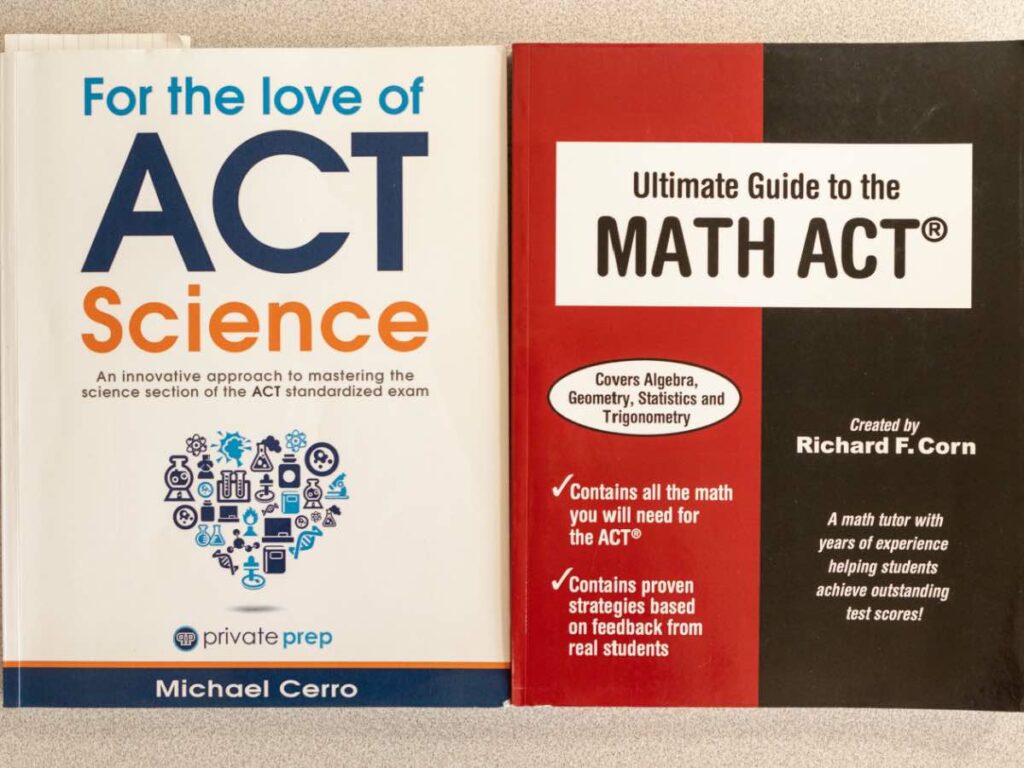
Last Minute ACT Tips on Boosting Your Score
When it comes to taking the ACT, there are many things that you need to remember to get an ACT score high enough to impress the college of your dreams.
It’s exactly because of this why we are going to keep the tips on how to earn the best possible score on the ACT even without devoting a minute of your time getting ready for it.
By keeping things simple, you will find it easy to get your hands on an ACT score so good that no one will think you didn’t study for the standardized exam.
Below, we will divide the tips into different sections — one for each ACT exam section. But let’s begin with some tips on breezing through the entire ACT…
Whether it’s the ACT or any other exam, there are certain things that you may do to help increase your chances of getting a good score, even with very little to no preparation.
- Get seven to nine hours of sleep. Taking the ACT with a rested and rejuvenated mind can make it easier for you to answer some of the questions correctly simply by being able to recall some of the things that you have learned since the day you entered the world of high school.
- Have a healthy breakfast. Flexing your brain requires a lot of energy. It’s because of this why, before heading to the test site, you should enjoy breakfast that’s dense in energy and nutrients. It’s also a great idea to eat properly several days before the ACT exam to get your mind in an optimal state.
- Take slow, deep breaths. Many of those who prepared very well for the ACT still get nervous. It doesn’t come as a surprise why many of those who didn’t prepare are a nervous wreck. Being anxious can keep you from thinking clearly and making intelligent guesses, which is why you should do your best to remain calm.
- Stay positive. Before you go to the test site and during the ACT, it’s important to stay positive. Refrain from thinking that the ACT was made to highlight what you don’t know — it’s made to give you the opportunity to show what you know! With a positive mind, you will find it easy to approach the questions productively.
- Answer easy questions first. Every ACT exam section has a time limit that can range from 35 minutes to 40 minutes. Because you don’t have forever to answer all the questions, it’s a good idea to answer all the easy ones first. You can always answer hard questions using the remaining time.
- Guess, guess, guess. Always keep in mind that you will not be penalized for getting a question wrong. It’s exactly due to this why it’s a good idea to guess if you don’t know the answer. After all, there is a 20% chance that you will guess the right answer each time. But for best results, make intelligent guesses only.
Doing well on English section of ACT
The English section of the ACT consists of 75 questions that you need to answer in just 45 minutes only — that’s 36 seconds only per question! Below are some surprisingly simple tips to help you ace the English section.
- Read the sentences. Many of the questions in the English section are about sentence structures. Don’t just read the sentences that require revision — read the sentences before and after them, too, to get an idea of the correct answer. But read fast. Again, you only have 36 seconds to answer a question.
- Pick the most concise. Conciseness allows conveying a message quickly and clearly. This is why, when choosing among the different phrasings for a sentence in the English section of the ACT, the least wordy choice is usually the correct one. There are exceptions to the rule. But when in doubt, go for the most concise option.
- Do not avoid NO CHANGE. Many students feel that the NO CHANGE answers are meant for test-takers that are too lazy to look for the correct ones. However, the NO CHANGE answer is the correct answer about 25% to 40% of the time. If it seems like there is no change, don’t be afraid to go for the NO CHANGE answer.
Doing well on Math section of ACT
It cannot be denied that the Math section is the most challenging and hated part of the ACT. Making matters worse is that the test-takers only have 60 minutes to answer all 60 questions! But follow the tips below, and you’re golden.
- Memorize basic formulas. Both the ACT and SAT have math. The SAT gives the test-takers a list of formulas. The ACT, on the other hand, does not. It’s due to this why knowing some basic formulas is a must. Fret not if you know no basic formula. One of the five choices is the correct answer, so make an intelligent guess.
- Use diagrams to your advantage. To make the most intelligent guesses possible in the Math section, check out the diagrams. In some instances, the diagrams can give you a clue to the correct answer, thus increasing your chances of getting it correctly without solving anything.
- Bring a calculator and use it. Although calculators are not required, they are allowed. Bring a calculator with you to the test site — and don’t be too embarrassed to use it. Using a calculator instead of manually computing things can help save time and also reduce your risk of committing computational mishaps.
Doing well Science section of ACT
Besides the Math section, the Science section of the ACT intimidates many test-takers, too. If you are one of them, just follow the tips and tricks below to get a decent ACT score even without studying for it one bit.
- Check out the visuals. Earlier, it was mentioned that diagrams can help you solve math problems. Well, the provided charts and illustrations can also help you solve a lot of science problems. They can help make some of the trickiest questions easier to understand and easier to answer, too.
- Write notes. Conflicting viewpoints are some of the most confusing and time-consuming science questions on the ACT. To save yourself from the need to read the whole passage, which can be really long, several times, write short margin notes. Also, use the process of elimination to find the correct answer each time.
- Read, read, read. What’s so nice about the ACT’s Science section is that obscure concepts and terms are commonly defined in the passages themselves, so don’t be terrified of a question containing something you don’t quite understand. Reading carefully can be your best friend in the Science section.
Acing the ACT Reading section
Like the name of this part of the ACT suggests, the Reading section requires reading comprehension skills. You will have to read a lot and answer 40 questions in just 35 minutes. Don’t despair — follow the tips below to shine in this section.
- Put your preference first. While talking about some overall tips on taking the ACT, it was mentioned that you should answer the easy questions first. The same is true with reading. The passages are always arranged with regard to the subject matter. Tackle your preferred subject matter first to avoid wasting precious time.
- Skip the passages. Some students find it easier to go through the Reading section by checking out the questions first and then searching for the answer in the passages. Most of the time, you will find the answers in the most crucial parts of the passages: the first and last sentences of each paragraph and the conclusion.
- Only one answer is correct. It’s not uncommon for test-takers to be torn between two choices, particularly those that both seem correct. However, it’s for certain that only one of the two is correct. If you’re in a pickle, go back to the relevant part of the passage and analyze it once again to find out the right answer.
Improve ACT Writing score
The ACT Writing section is optional. If you plan to apply to a college that requires the applicants to submit their ACT Writing scores, you have no choice but to take it. Follow the tips below to get the Writing section right.
- Write not less than two pages. The optional Writing section of the ACT is 40 minutes long. This gives you plenty of time to write, which is why you should aim to write at least two pages. The Writing section’s score ranges from 2 to 12. To get 5 to 7 on the Writing section, you will need to write at least three pages.
- Focus on the introduction and conclusion. The people who grade the ACT focus more on the first and last paragraphs. Needless to say, the introduction and conclusion are two of the most important things you will ever write while taking the ACT. To ace the ACT Writing section, start strong and end strong.
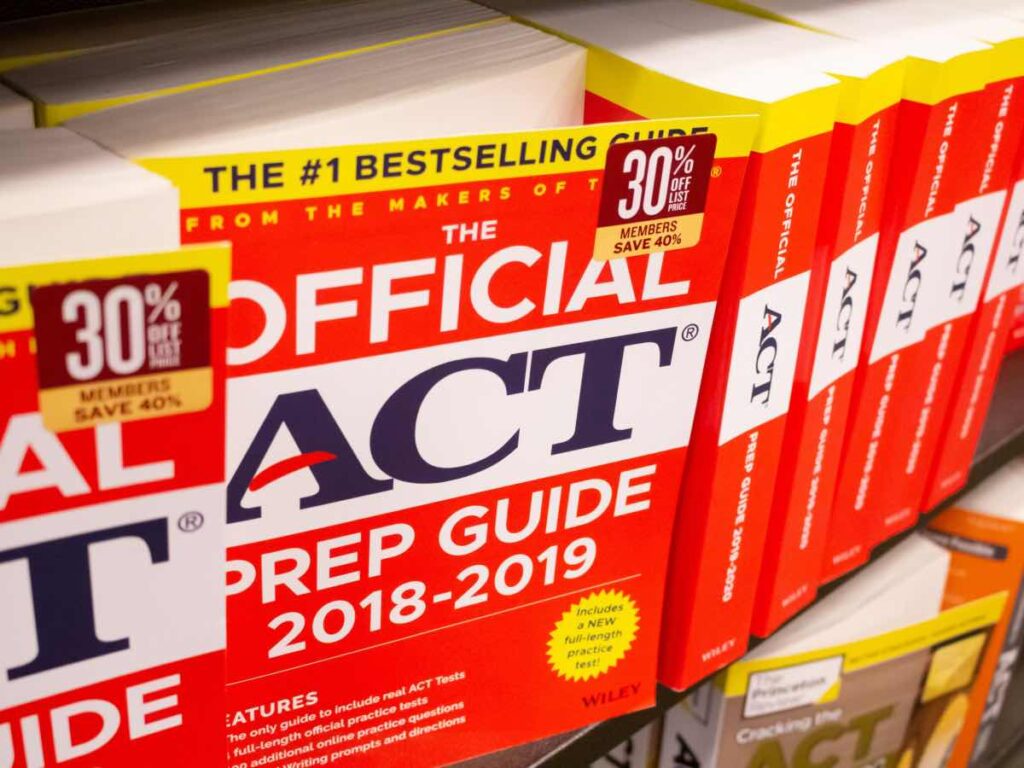
How to Ace the Act Without Studying
If you’re taking the ACT soon and you haven’t studied at all, don’t panic. You can still ace the test with some smart strategies and tips.
Here are some of them:
Take a practice test
This will help you get familiar with the format and timing of the test, as well as identify your strengths and weaknesses. You can find free practice tests online on ACT.org
Review the basics
You don’t need to memorize every formula or rule, but you should review the main concepts and skills that are tested in each section.
For example, for math, you should know how to work with fractions, decimals, percentages, algebra, geometry, and trigonometry.
For English, you should know how to identify and correct grammar and punctuation errors, as well as improve sentence structure and word choice.
Use the process of elimination
There is no penalty for guessing on the test, so you should always answer every question. However, you can increase your chances of getting the right answer by eliminating the obviously wrong choices first.
Stay calm
The most important thing is avoiding stress or anxiety affect your performance. Instead, focus on doing your best and answering as many questions as you can correctly. Remember that you can always retake the test if you’re not satisfied with your score.
Disclaimer: The views and opinions expressed in this article are those of the authors and do not necessarily represent those of the College Reality Check.

